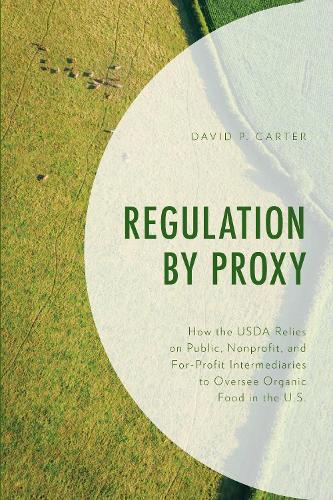
Regulation by Proxy: How the USDA Relies on Public, Nonprofit, and For-Profit Intermediaries to Oversee Organic Food in the U.S.
(Paperback)
Available Formats
Publishing Details
Regulation by Proxy: How the USDA Relies on Public, Nonprofit, and For-Profit Intermediaries to Oversee Organic Food in the U.S.
By (Author) David P. Carter
Bloomsbury Publishing PLC
Lexington Books
18th October 2021
United States
Classifications
Professional and Scholarly
Non Fiction
Agriculture and farming
344.7304232
Physical Properties
Paperback
256
Width 153mm, Height 219mm, Spine 19mm
472g
Description
Regulation by Proxy catalogues the intermediaries that are critical to organic certification, including the National Organic Standards Board, accredited certifying agents, organic inspectors, the California State Organic Program, the Accredited Certifiers Association, the International Organic Inspectors Association, and material review organizations. Drawing on a range of evidence, from original data to the work of prominent food policy authors, Carter assesses each intermediarys contributions to organic standards development, administration, and enforcement. Carters analysis shows that there are undeniable benefits to how organic food is regulated in the U.S., however, relying on an assortment of intermediaries requires multifaceted oversight for which the USDA may not always have sufficient tools or capacity to realize.
Reviews
In 1862, President Abraham Lincoln signed legislation creating the United States Department of Agriculture (USDA), which was charged with making laws to protect the agricultural trades and ensuring food quality and safety. The job of overseeing food quality and safety had a strong, standardized, scientific component housed within the USDA. This was the situation until the advent of organic farming in the 1940s and the growing popularity of halal and kosher foods in the US. The USDA was not equipped to objectively define and consequently assess the standards for these specialty foods: there was a fair amount of disagreement about what constituted "organic" food, and it would be impossible for the USDA to oversee every halal and kosher practice. Carter (political science, Univ. of Utah) delivers a fascinating, detailed account of how the USDA made use of outside entities to develop guidelines and standards for certifying these foods. The author provides critical analyses of the benefits and risks of using these entities to determine parameters of food quality and safety. The book includes many case studies and references to prime sources, and it makes mention of the impact of genetic engineering on food production practices.
Summing Up: Highly recommended. All readers.
Regulation by Proxy is both empirical and theoretical, making it useful to those interested in the regulatory process and regulatory theory. It makes important contributions to both the narrower topic of organic regulation and the broader discussions of regulatory policy. In a time when many are questioning the legitimacy of the organic food label, the book offers measured reassurance. . . Toward the end of the book, Carter states that he set out to conduct the most thorough analysis possible of the complex regulatory architecture by which organic food is governed in the U.S. (p. 199). On all counts, he has succeeded.
* Journal of Agriculture, Food Systems, and Community Development *This multifaceted analysis of USDA Organic Food Certification is valuable reading for scholars and policy practitioners who seek to understand decentralized regulatory programs. Carter traces the development of this complex regulatory design, dissects the patchwork of non-governmental and private-sector intermediaries, analyses the perspectives of organic food producers, and assesses the overall program impact. One learns much from this highly readable book about organic food certification in the United States and gains insights about the strengths and limitations of regulation by proxy. -- Peter J. May, emeritus, University of Washington
David Carters Regulation by Proxy is essential reading for anyone seeking to understand the complex system of regulatory governance that administers USDA organic standards in the U.S. His account provides a comprehensive overview, historical background, and detailed analysis of key aspects of the system. This careful case study reveals deep truths about the decentralized nature of the U.S. regulatory system more generally. -- Timothy D. Lytton, Distinguished University Professor at Georgia State University and author of Outbreak: Foodborne Illness and the Struggle for Food Safety and Kosher: Private Regulation in the Age of Industrial Food
The transformation of regulatory governance has captured the attention of scholars for decades. Not often are we presented with a book as rich in empirical detail and broad in theoretical scope as Regulation by Proxy. This book has implications well beyond organic food regulation and well beyond the USA. It is a must-read for regulatory scholars and practitioners alike. -- Jeroen van der Heijden, Victoria University of Wellington
In skillfully assimilating a diverse collection of revealing evidence, David Carter takes the reader on a fascinating tour of the varied relationships that guide administration of USDAs organic certification program. His thorough and insightful book represents an indispensable contribution to scholarship examining how public administrators actually implement policies, revealing the ways in which a contemporary regulatory system melds traditional oversight with the participation of a wide range of nongovernmental actors in standard setting and enforcement to achieve key policy goals. -- Christopher Carrigan, George Washington University
Author Bio
David P. Carter is assistant professor of public policy and administration at the Public Affairs Program of the Department of Political Science, University of Utah.
